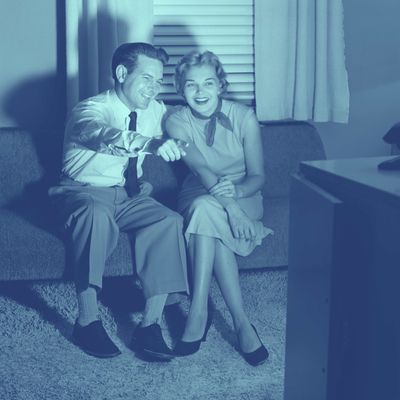
For several of the TV shows it streams, Netflix knows the precise episode that’s most likely to transform you from a casual watcher to a full-on, hopelessly hooked, I-can’t-remember-the-world-beyond-my-couch binge-watcher. They call it the “hook” episode. For House of Cards, that moment happens three episodes in; for Mad Men, it’s six; for Breaking Bad, all it takes is two. A study by the company last year found that 70 percent of people who watched a given show’s hook episode went on to finish the first season.
Despite this knowledge, though, Netflix still insists on continuing with the bane of many a binger’s existence: the “Are you still watching?” notification. The episode pauses, a question that looks a lot like a value judgment appears on the screen, and you have to press a button to make it go away, resuming your show with just a little more shame than you had before. Just because 30 Rock has been streaming on my computer for two and a half hours now doesn’t mean I’m not here, Netflix. I’m very much here, in fact, and don’t intend to be anywhere else for at least another two episodes. I’ll deal with the regret later.
Or, hey, maybe I won’t. In a recent study in the Journal of Health Psychology, researchers analyzed the psychology of TV binge-watching, examining what motivates people to binge-watch and how they feel about the habit, and among the results was some good news for anyone who prefers to spend their weekends on the couch with the TV on.
The study authors, who defined binge-watching as taking in more than two episodes of the same show in one sitting, recruited 86 volunteers to fill out a survey about their TV-watching habits: how much time they spent, the amount of regret they anticipated feeling after a binge, how often it interfered with other things they wanted or planned to do (what the researchers termed “goal conflict”). The subjects were also asked to explain their decision-making processes: Was a binge something they consciously sat down to do, or did they end up passively letting it happen, as the one episode automatically continued into another?
Maybe unsurprisingly, the authors found that people were likelier to binge if they viewed it as an automatic rather than conscious process — a finding, they said, that could potentially be used to curtail binge-watching in the future. “The role of automaticity suggests that interventions aiming to address problematic binge watching (e.g. due to increased sedentary activity) could consider techniques that address automaticity,” the study authors write. “For example, some online streaming services include inbuilt interruptions after a number of consecutive episodes have been viewed.” That Netflix pop-up, in other words, can jolt people out of a sort of TV daze, allowing them to decide more purposefully if they want to continue.
But the more important takeaway, in this sloth’s humble opinion, is that higher anticipated regret was associated with less of a likelihood to binge, as was perceived goal conflict. When a TV marathon would get in the way of other things, it seems, people had enough willpower not to sit down and start one — meaning that maybe we’re not just unwilling slaves to our laptops and TV sets (or, at least, not when it matters).
Sounds like permission enough to me. Go forth and binge in peace (and if you’re serious about it, turns out there’s a way to disable the notifications). Just, you know, maybe remember to step outside every once in a while.

